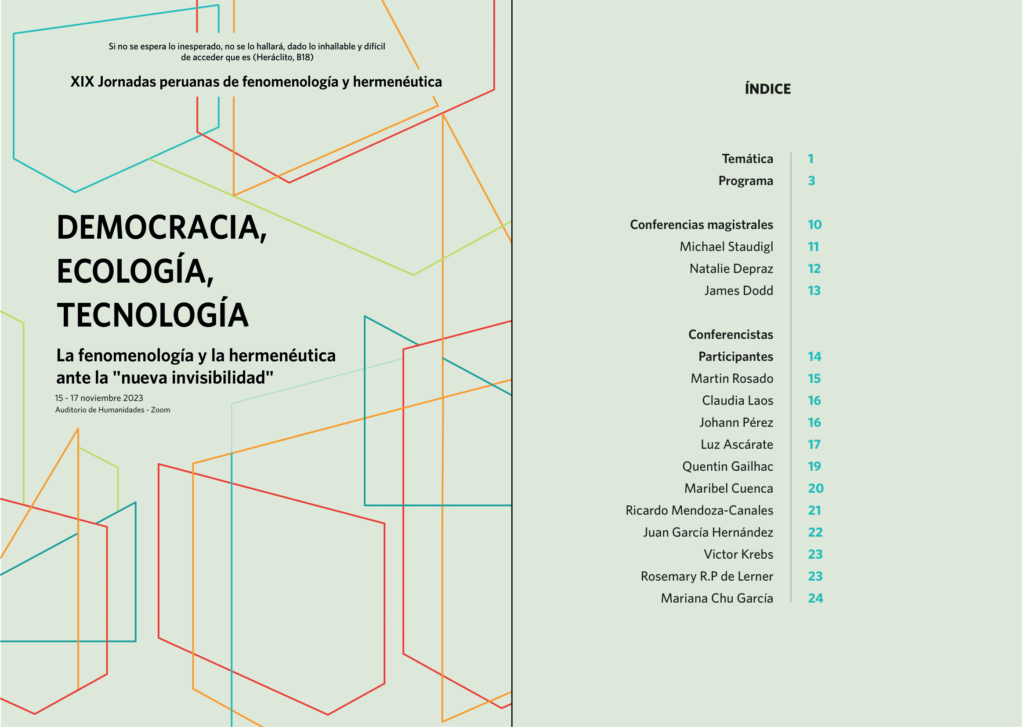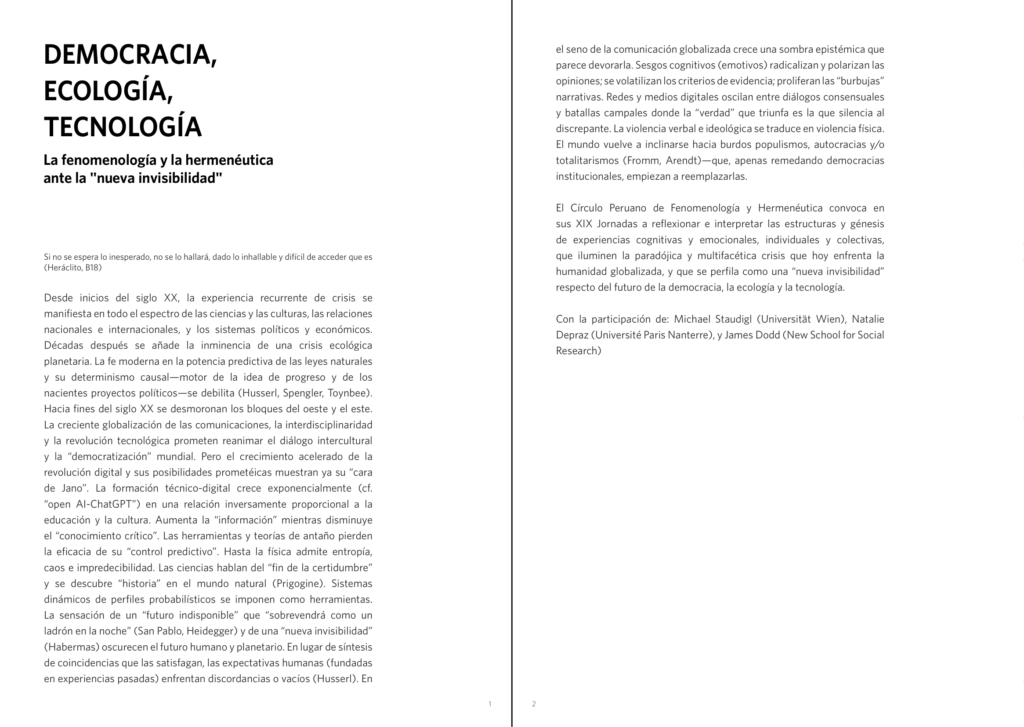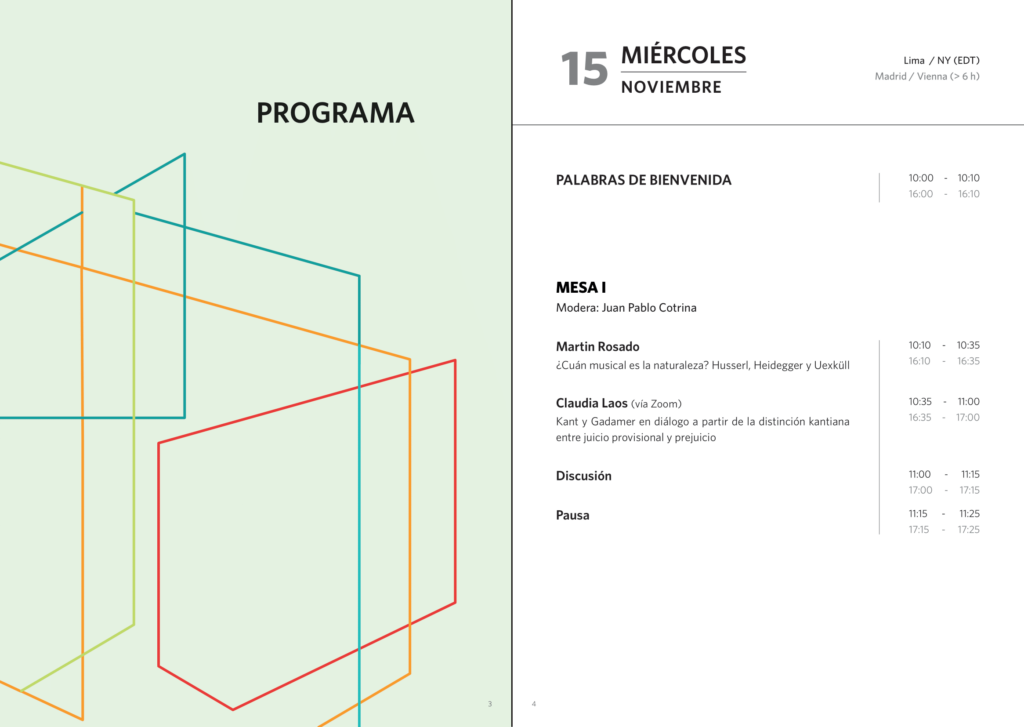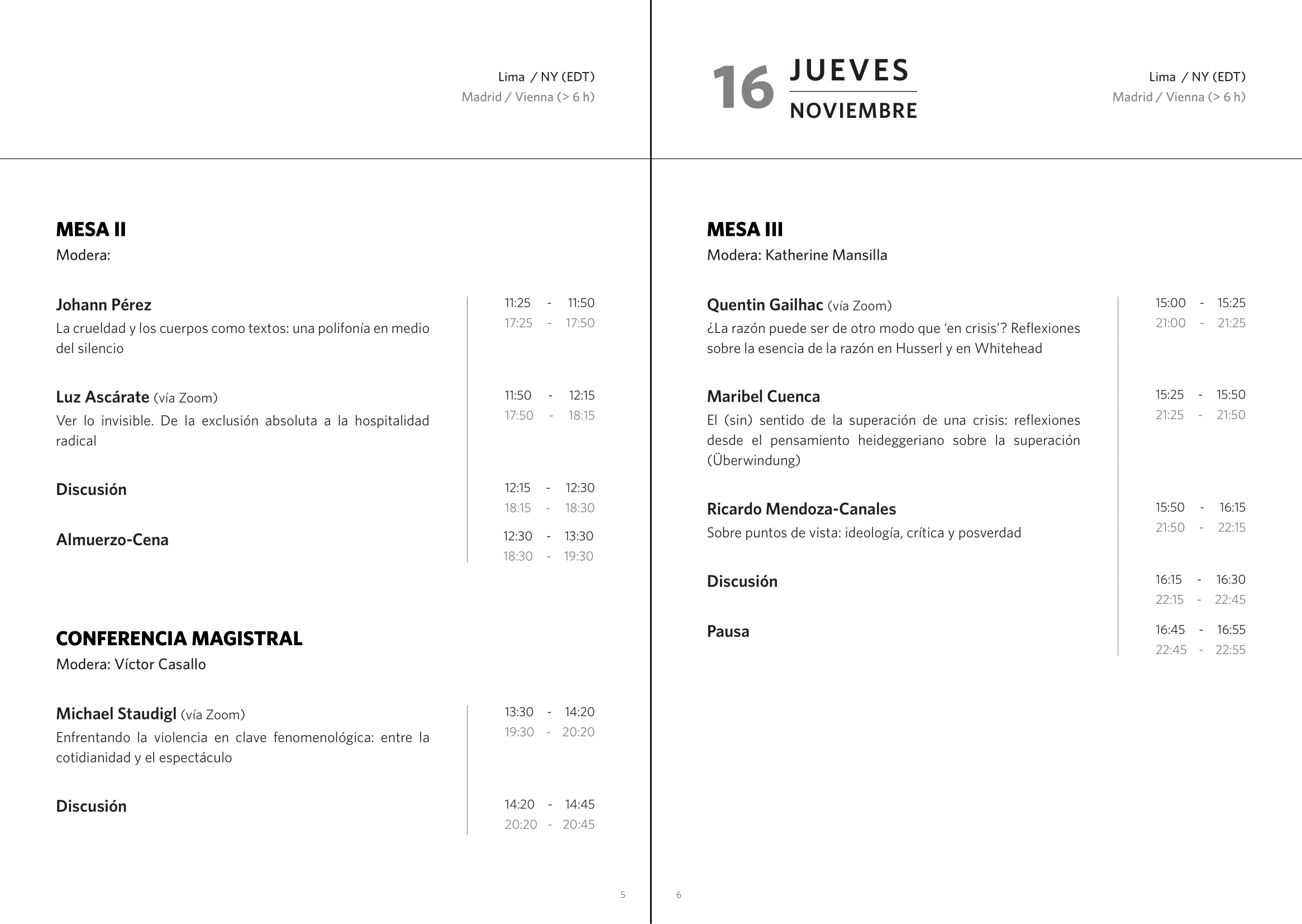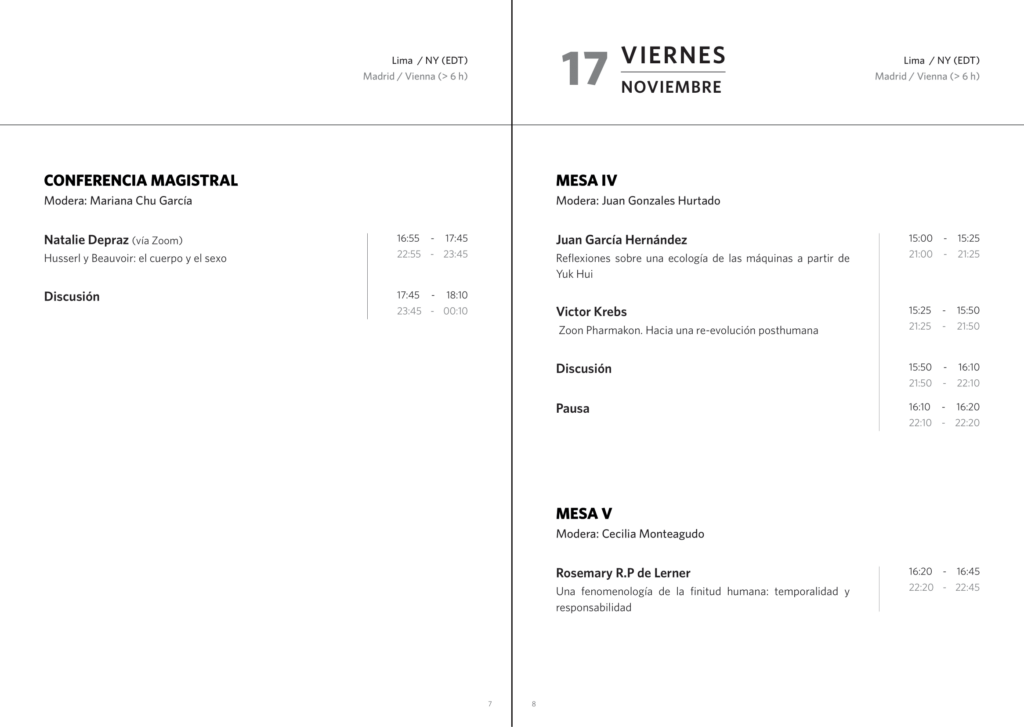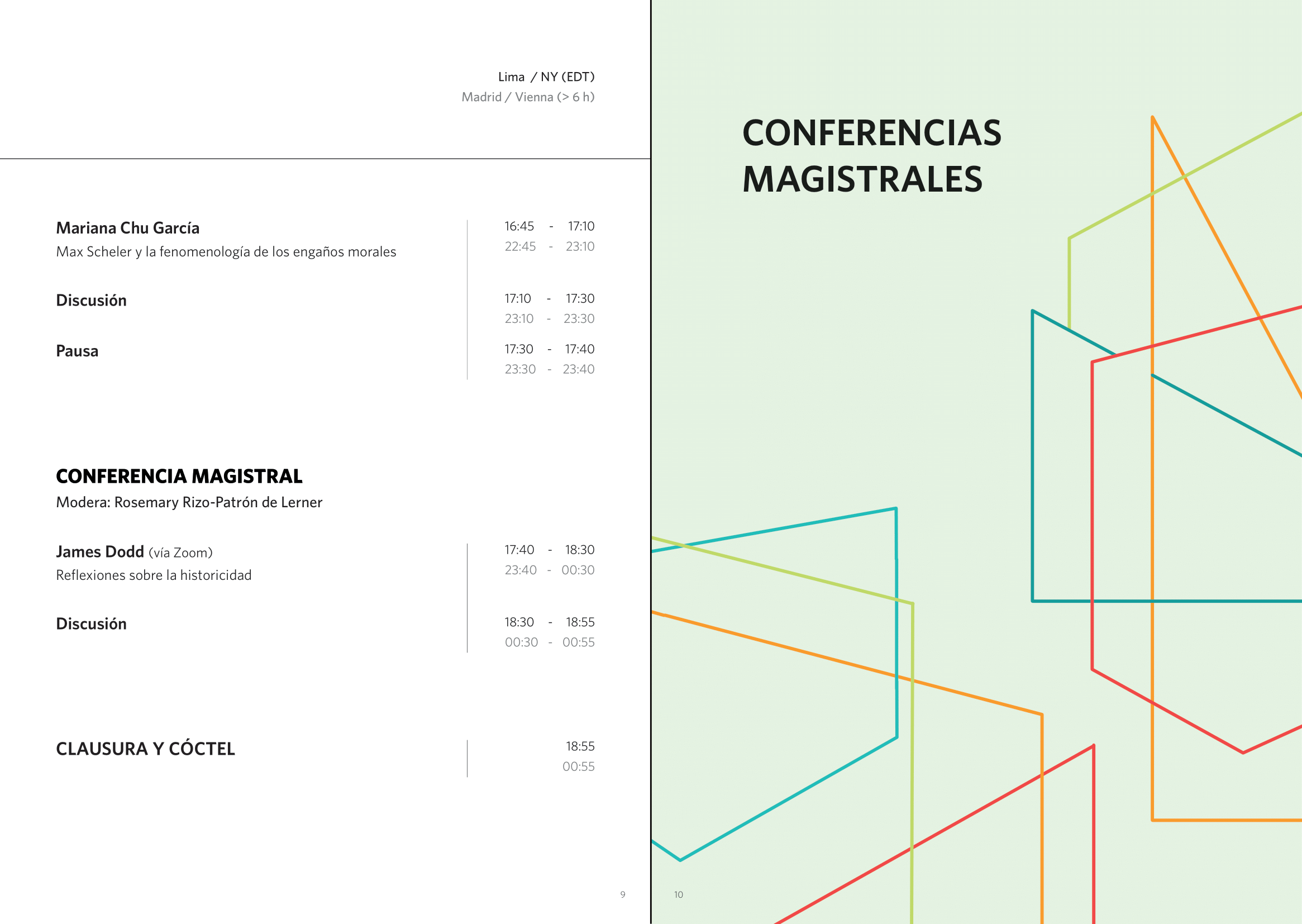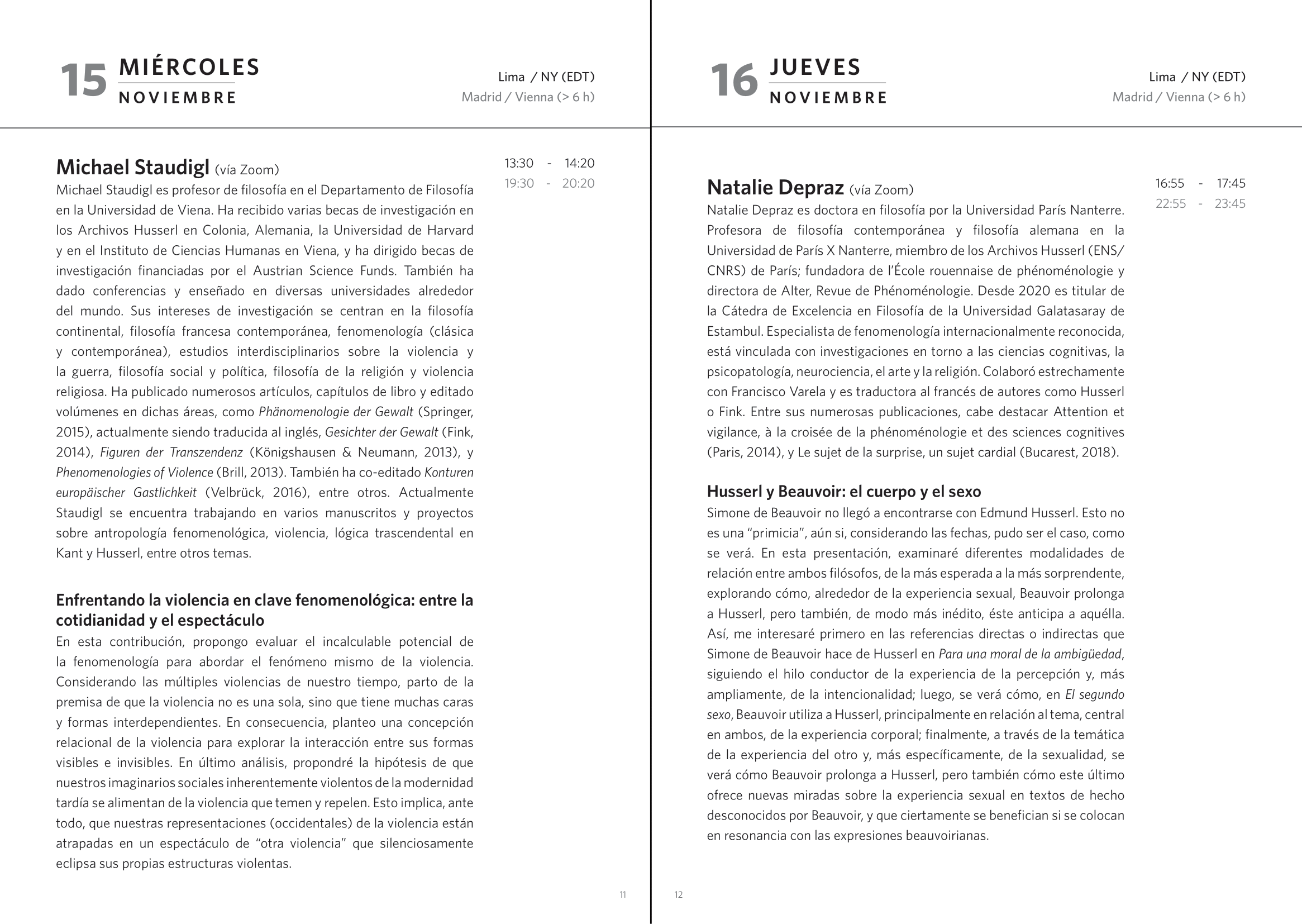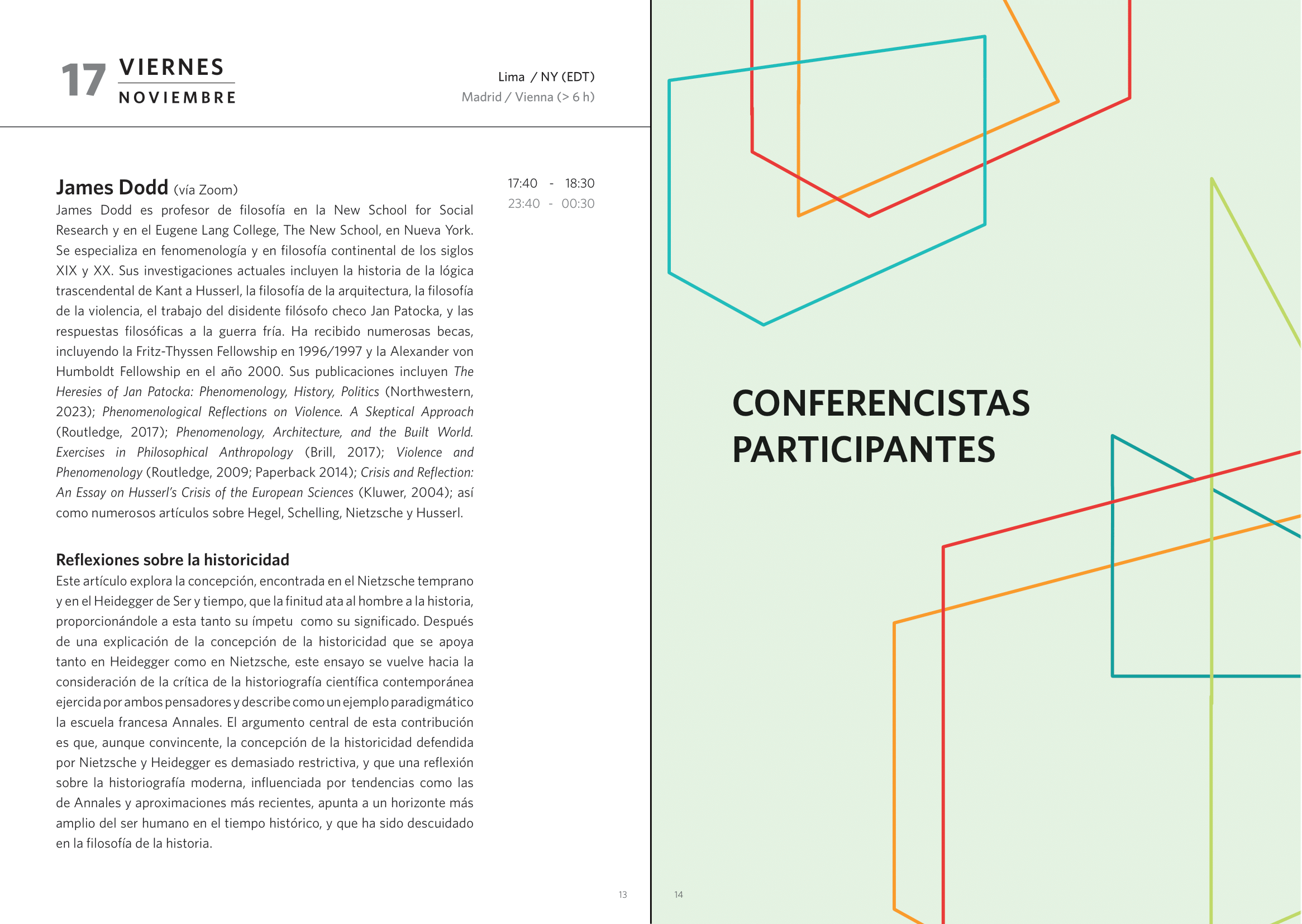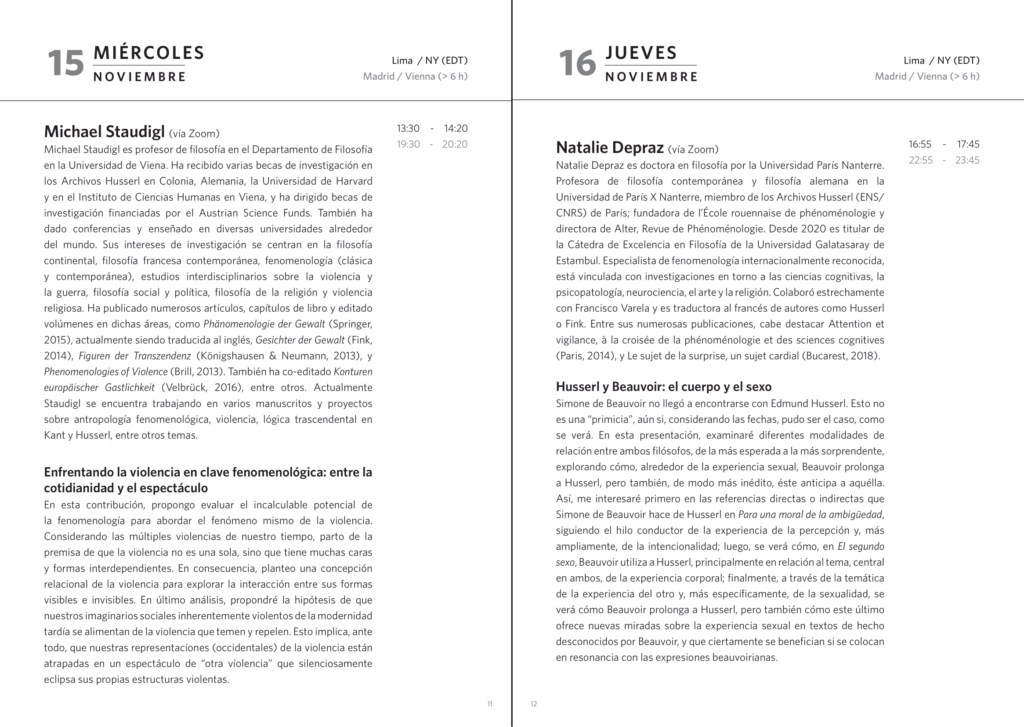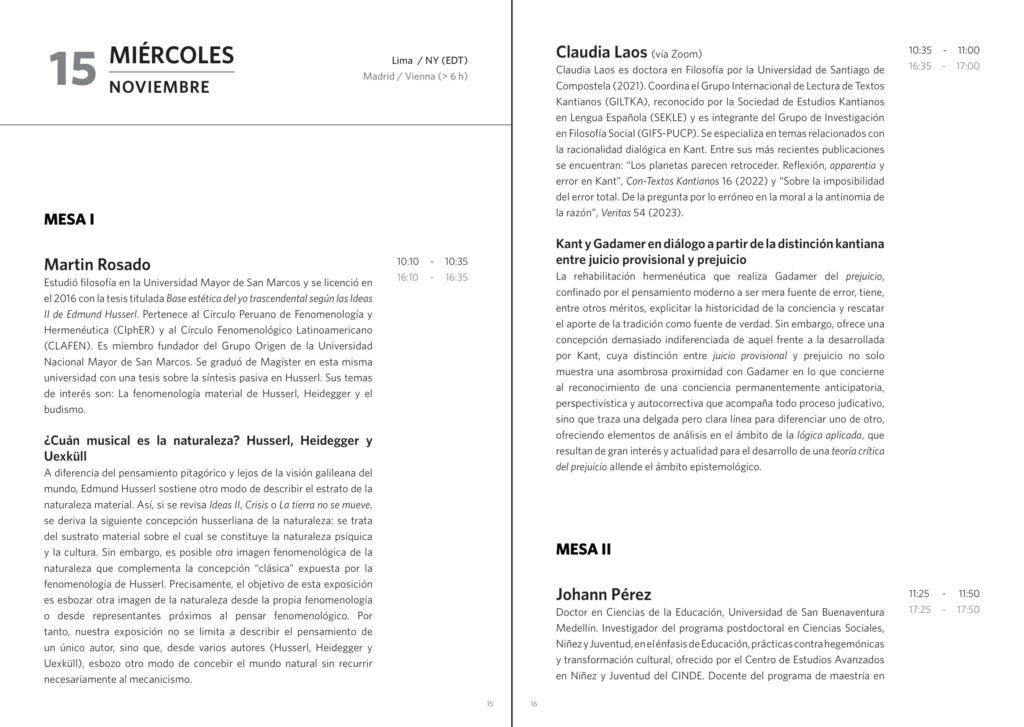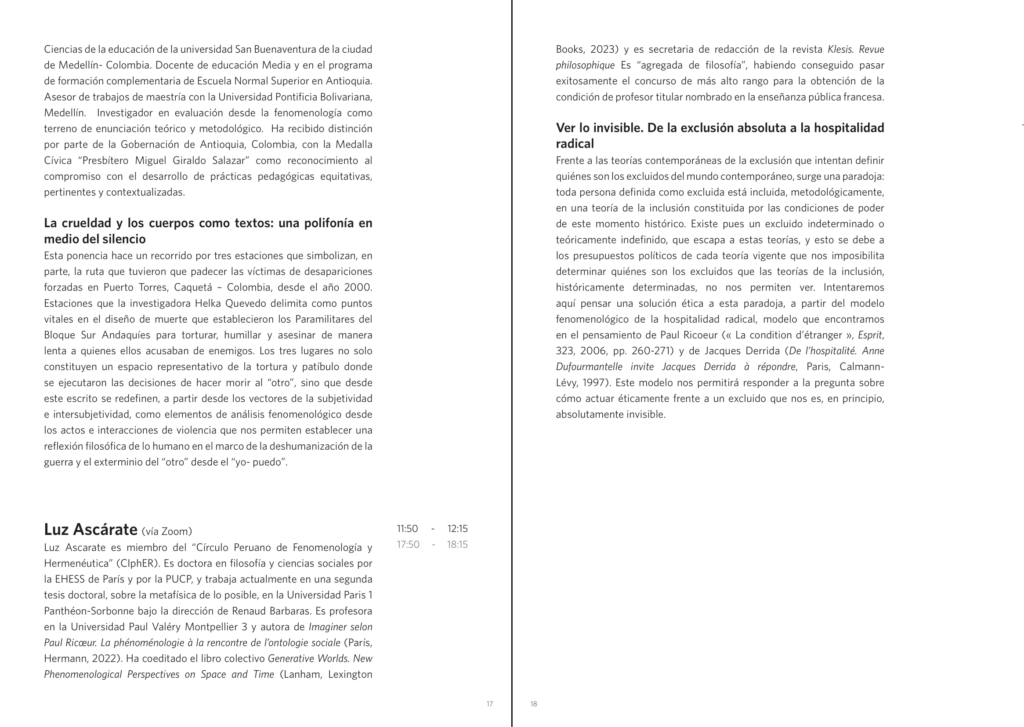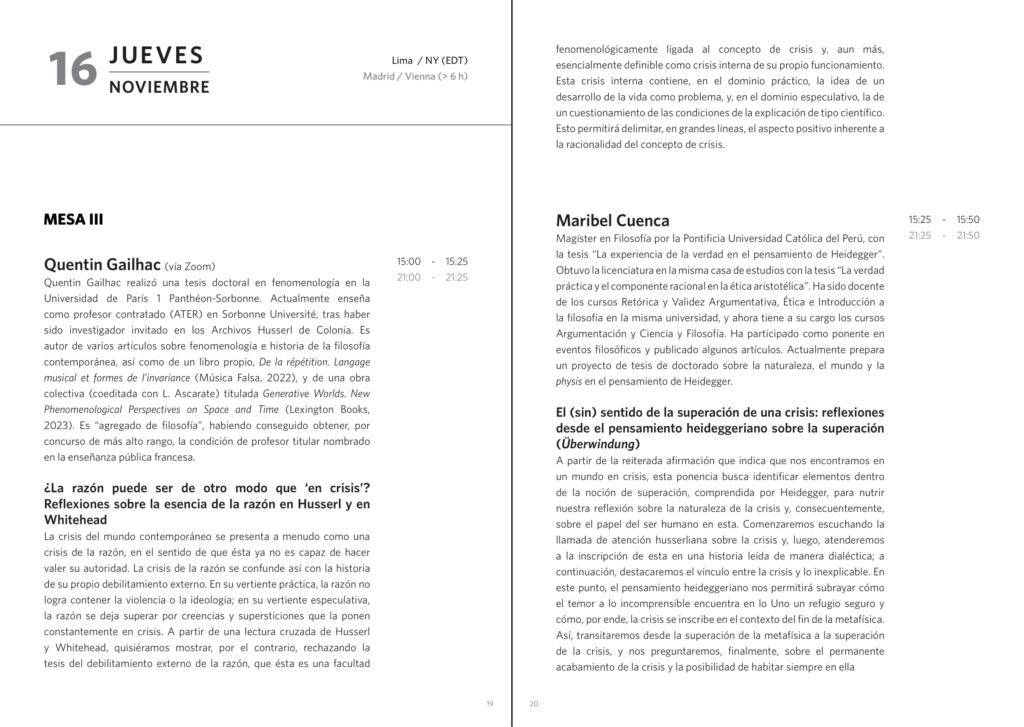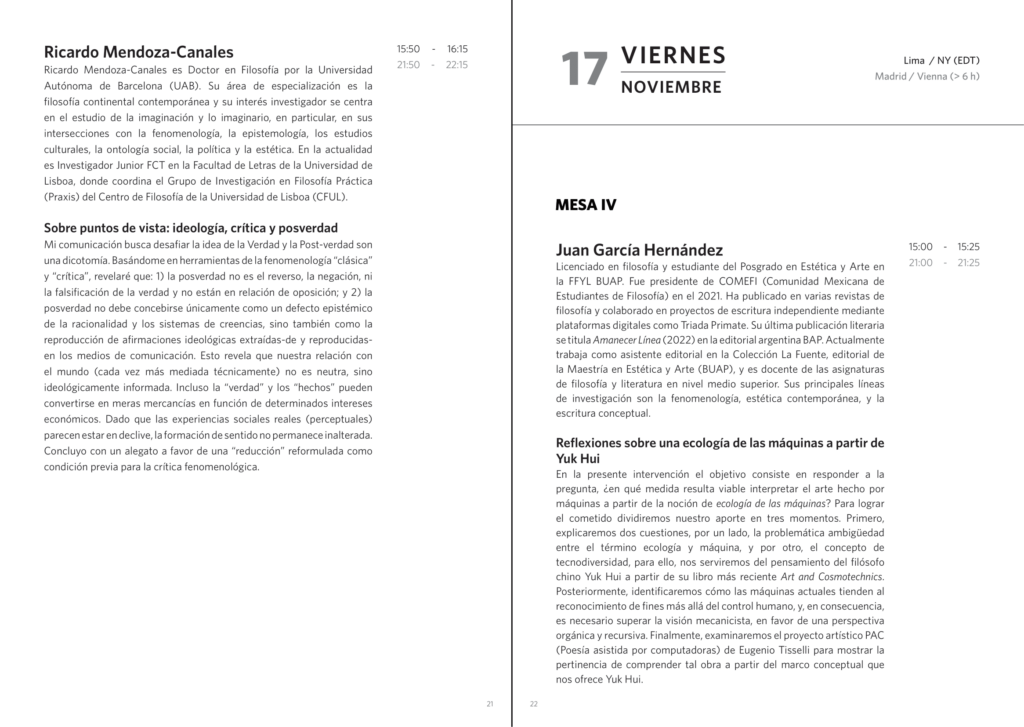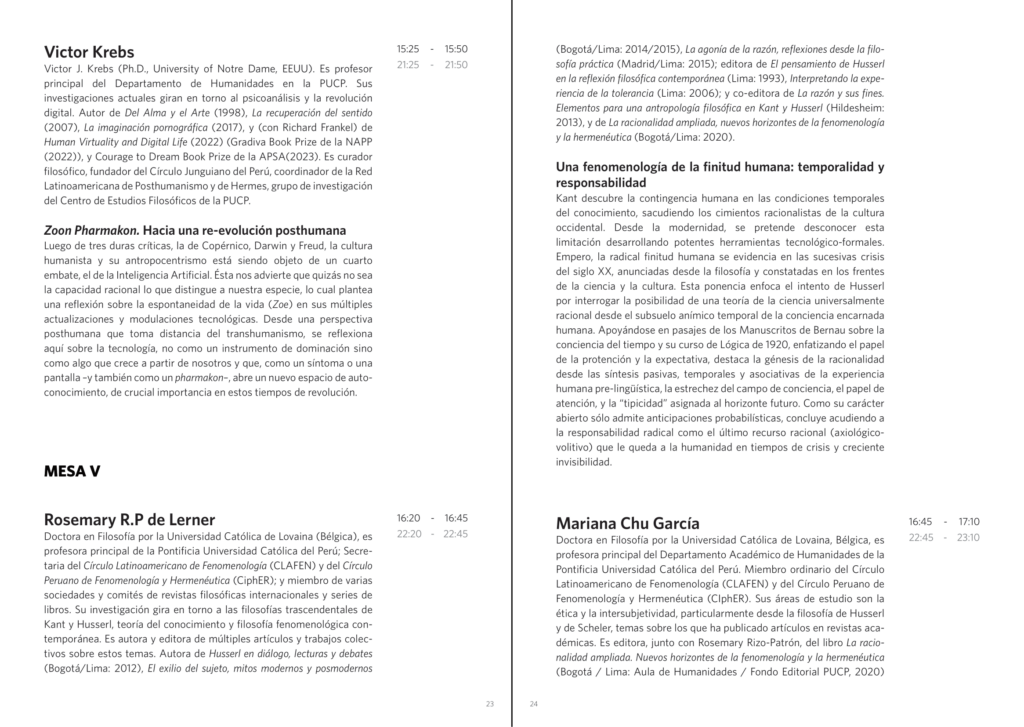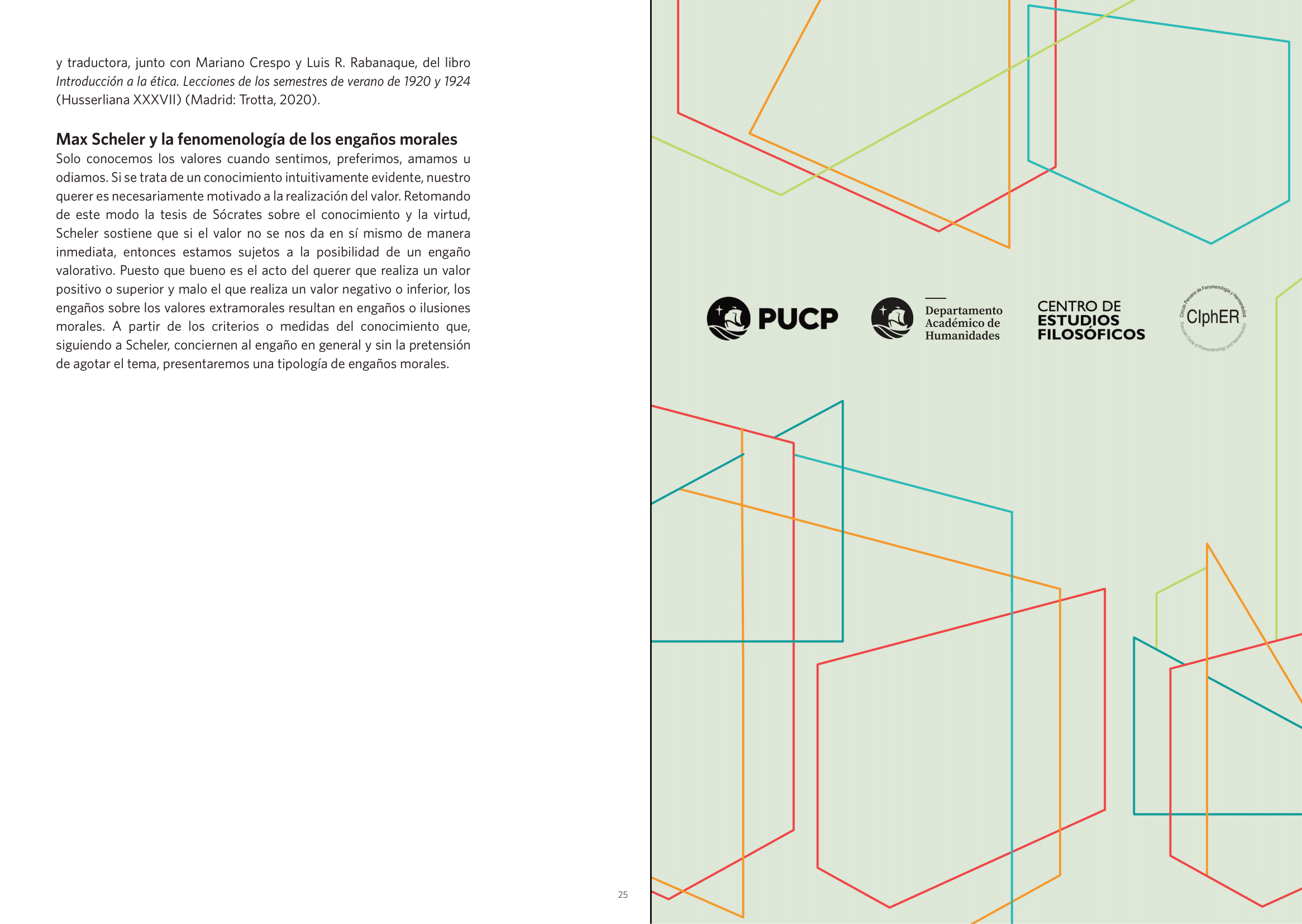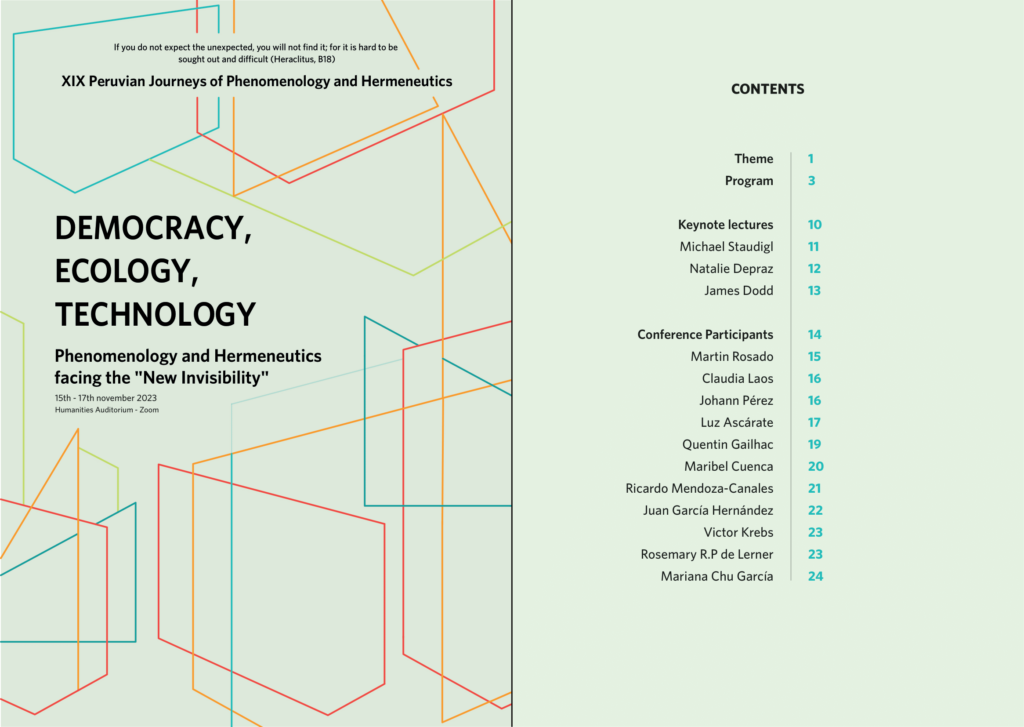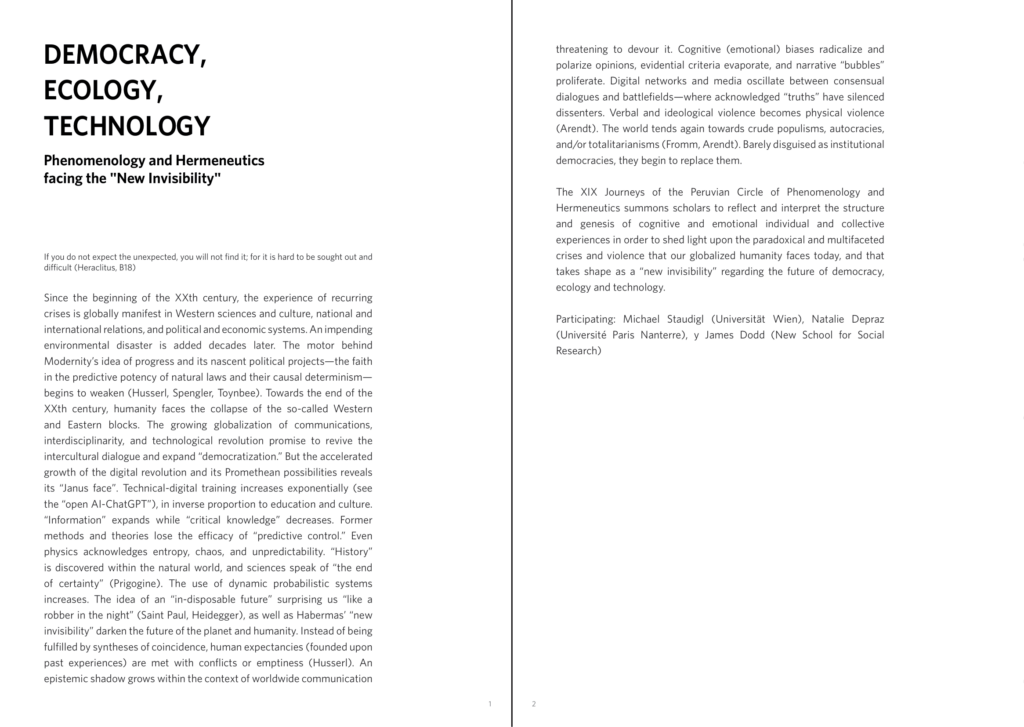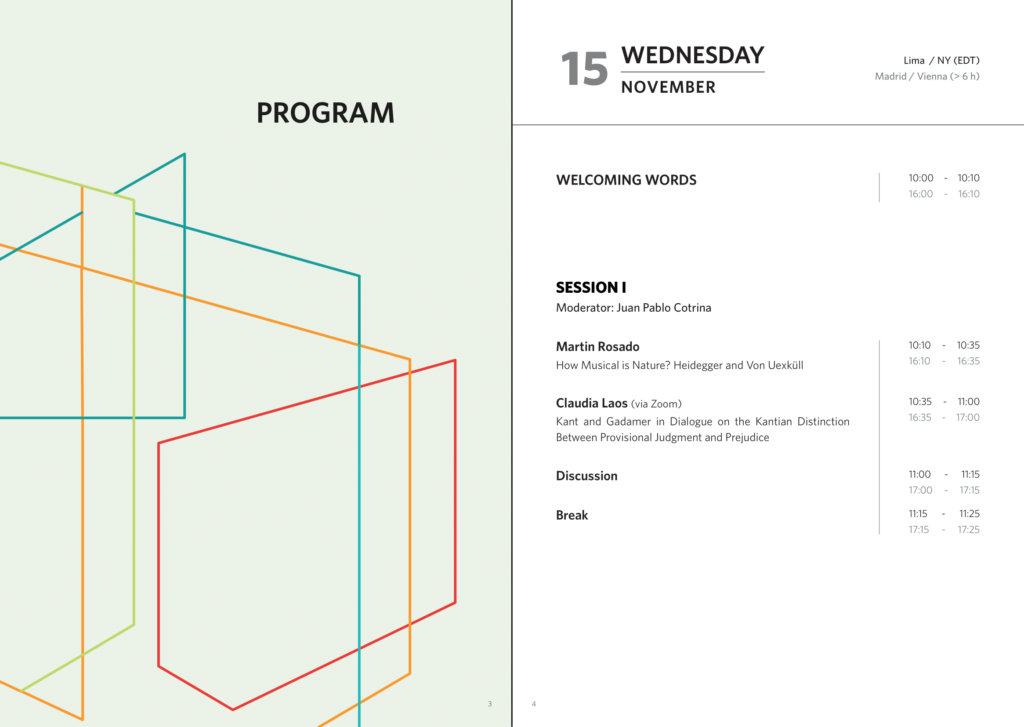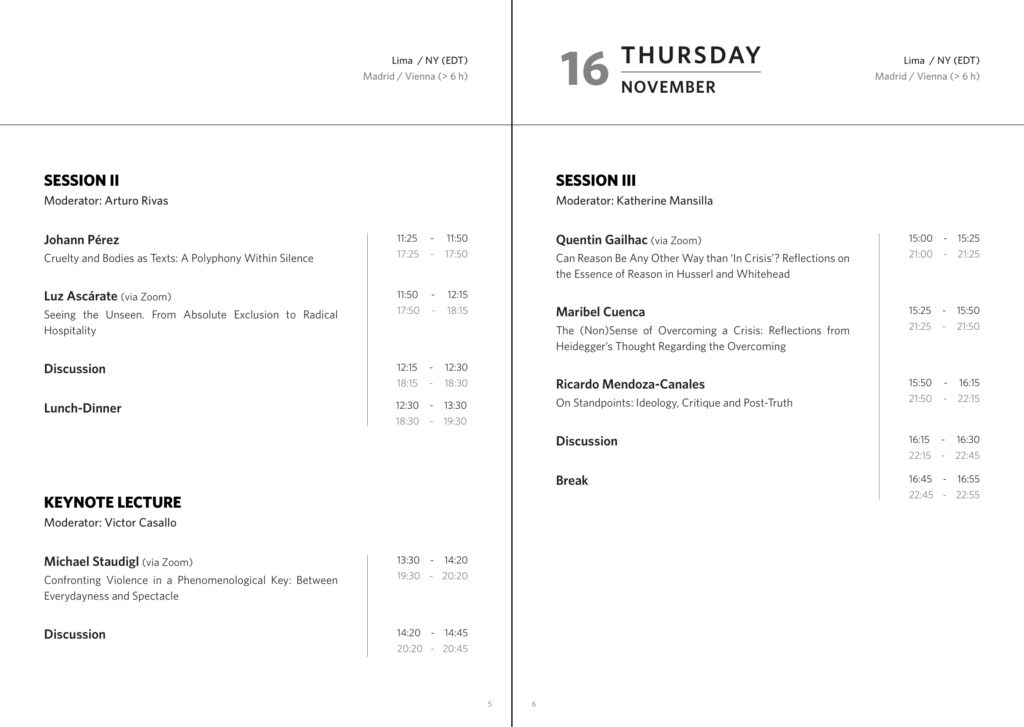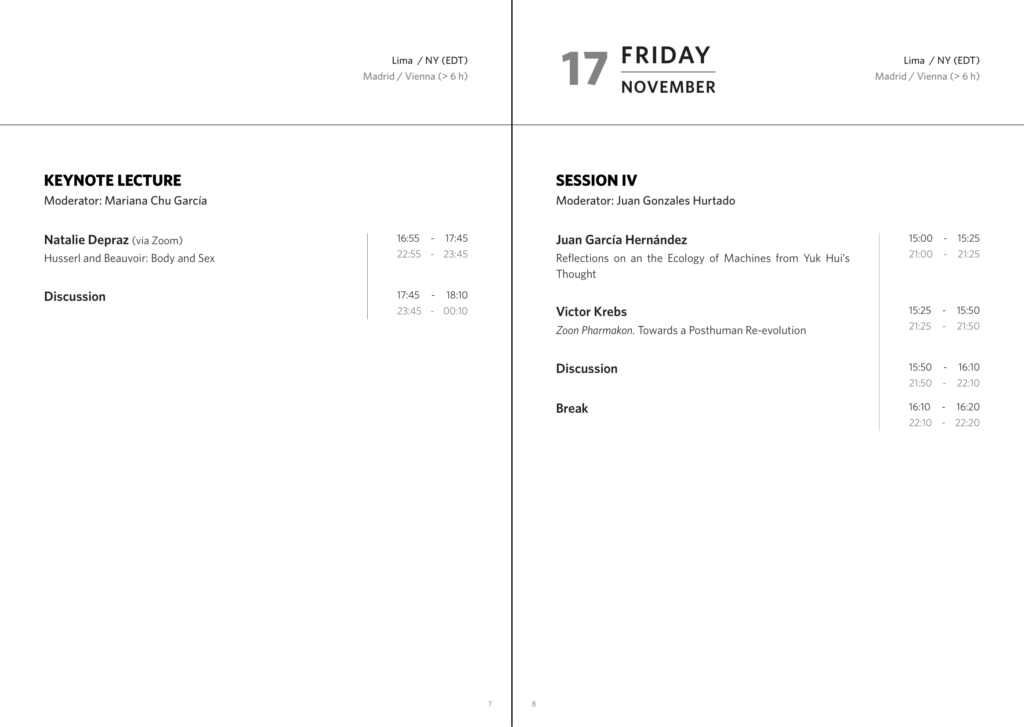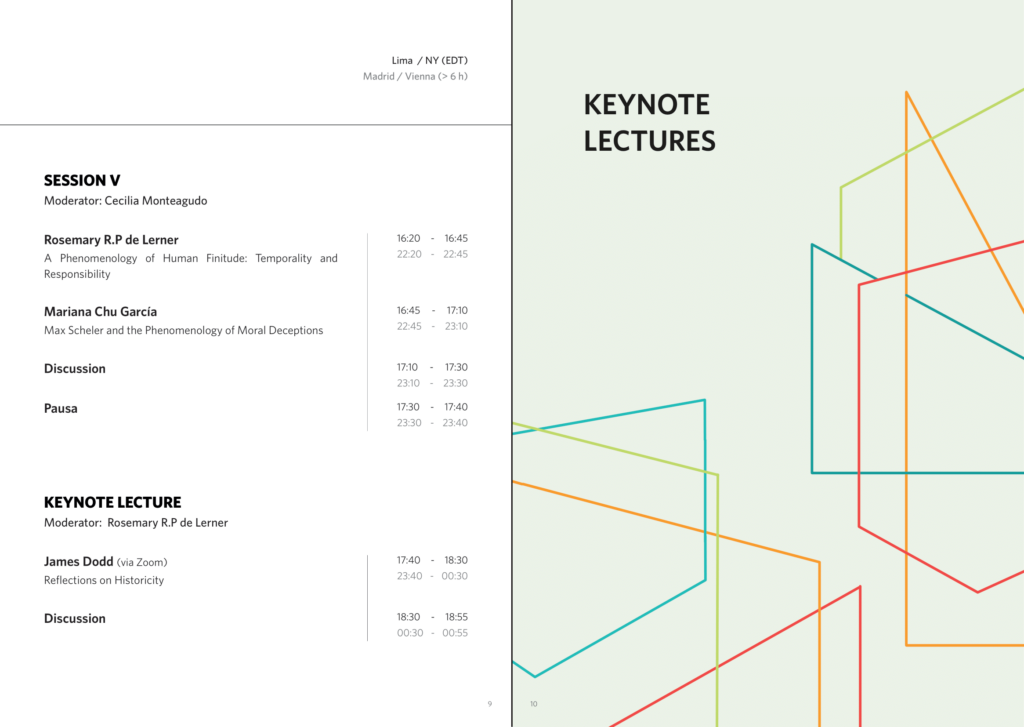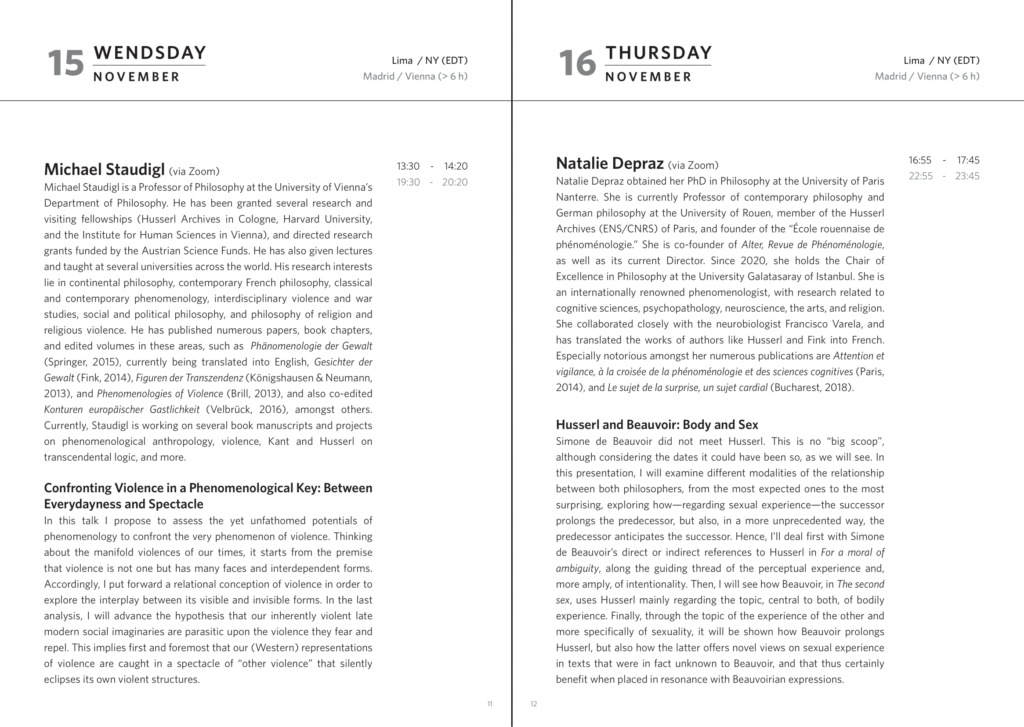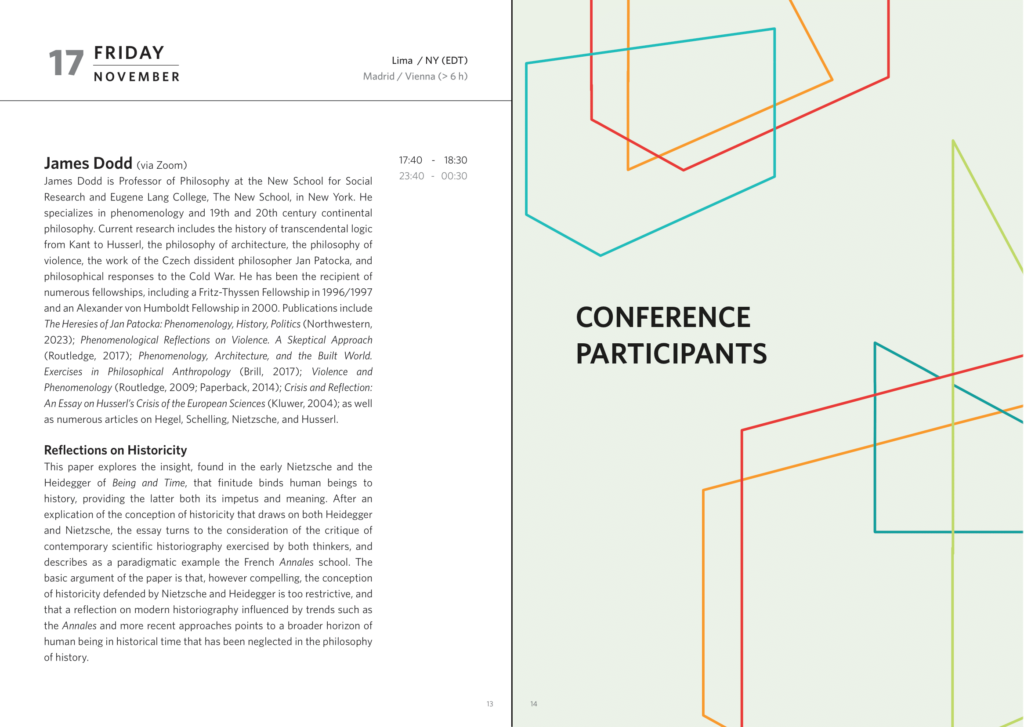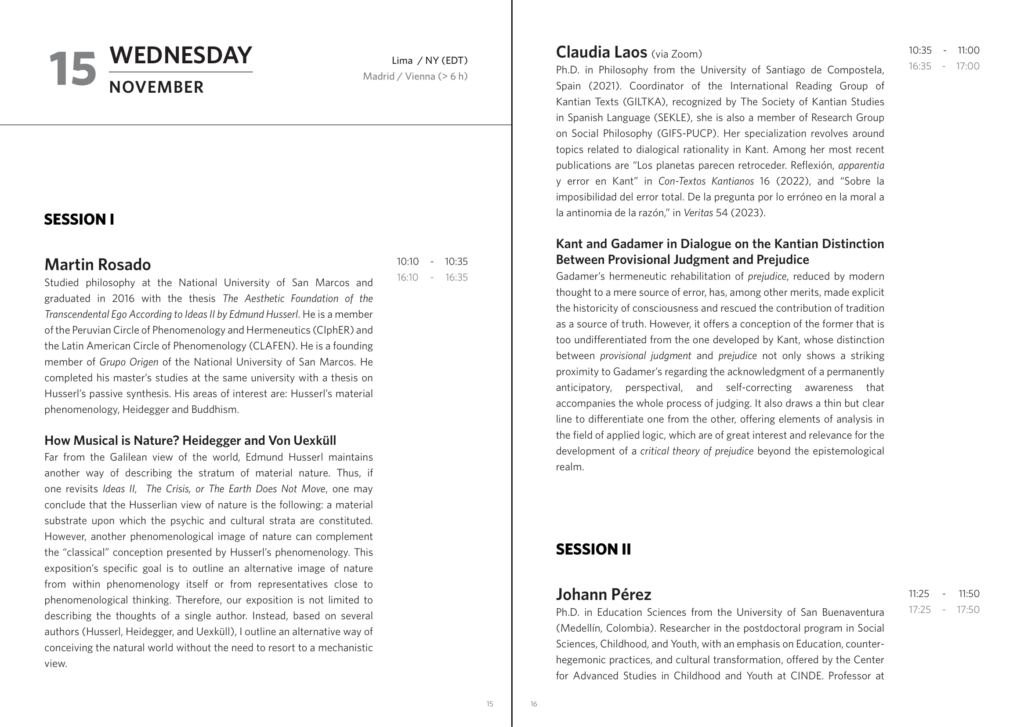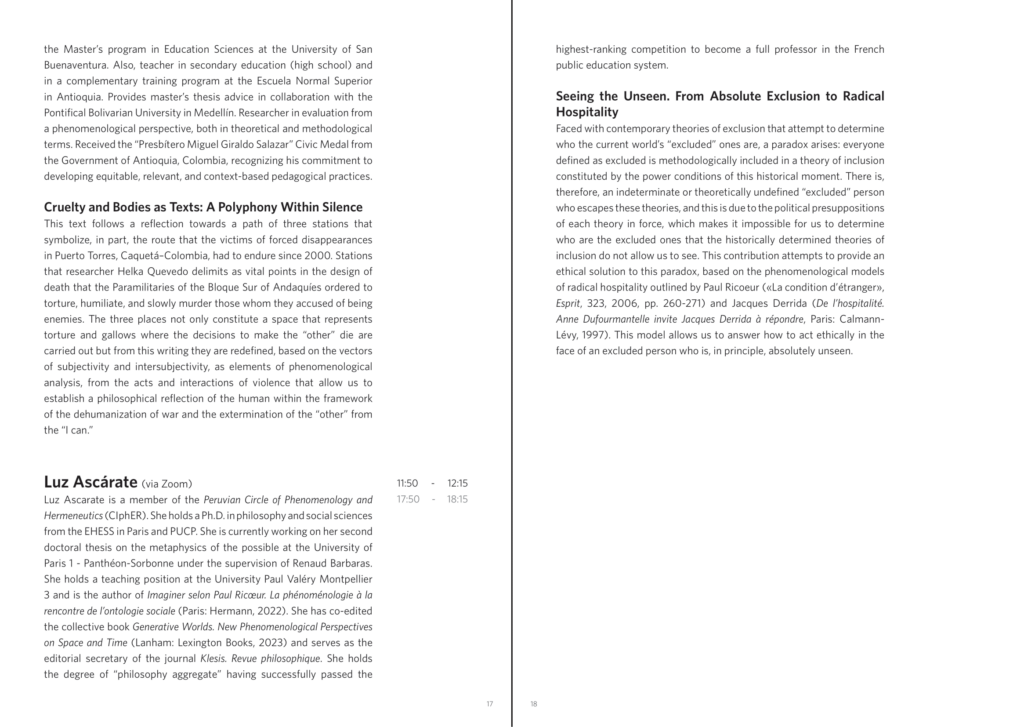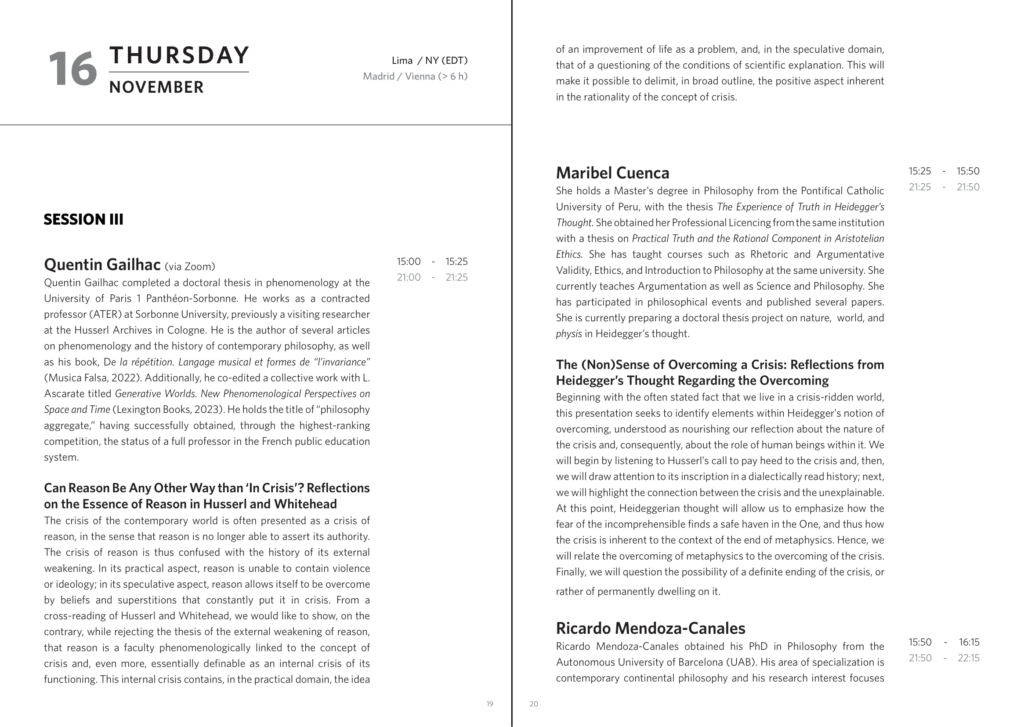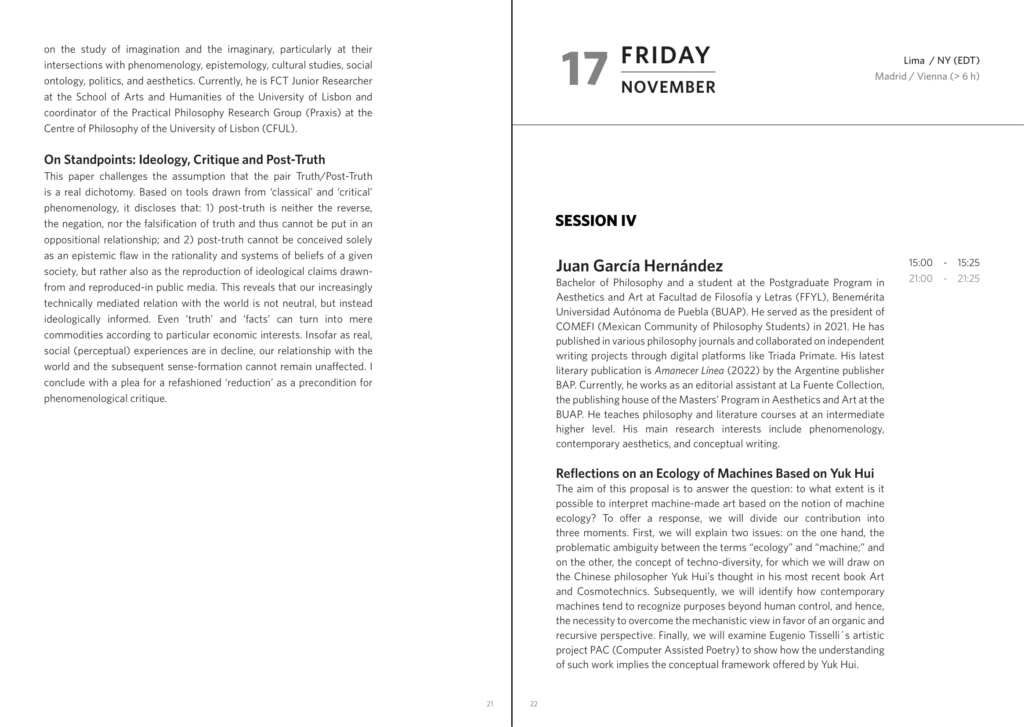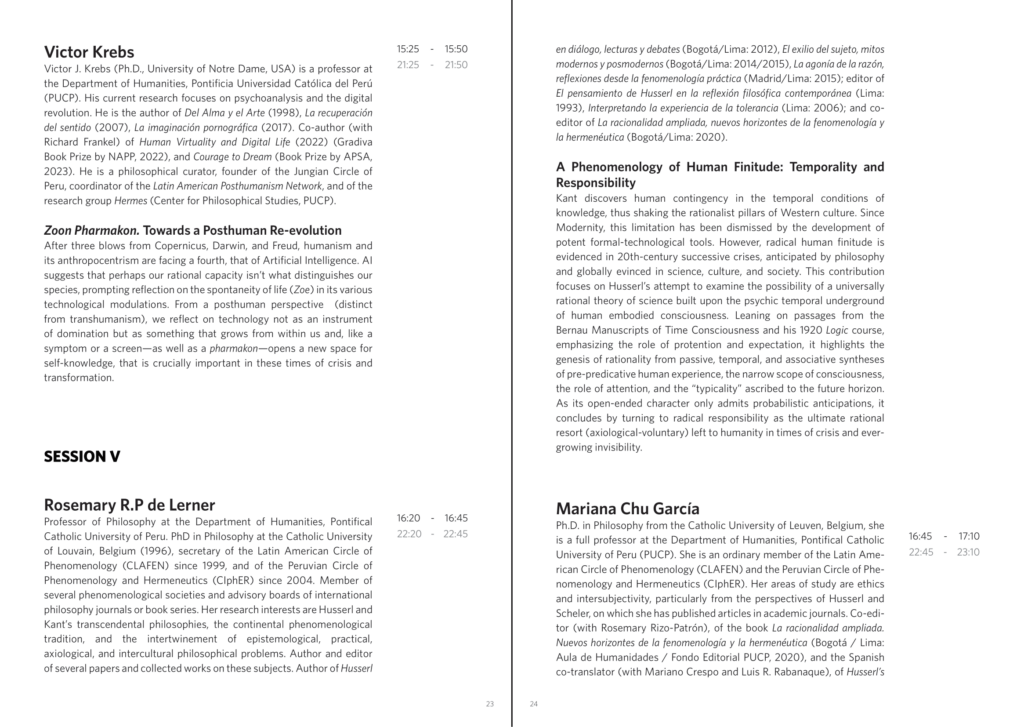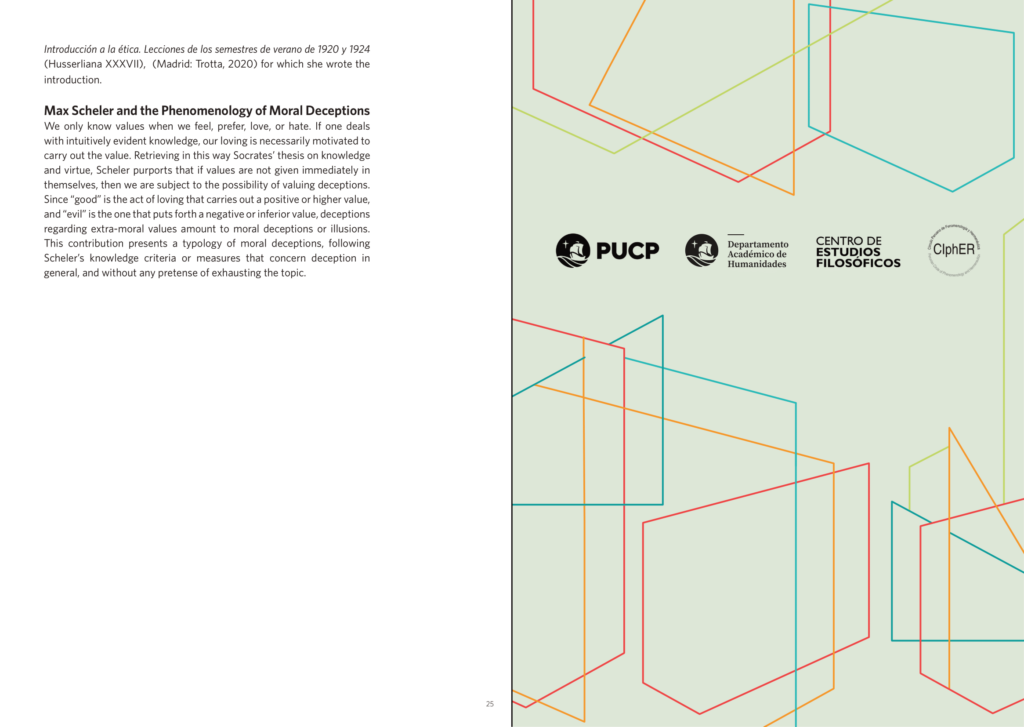-
Inicio
Del 15/11 al 17/11 -
Ubicación
Humanities Auditorium (PUCP) & Online
Presentation
If you do not expect the unexpected, you will not find it; for it is hard to be sought out and difficult (Heraclitus, B18)
Since the beginning of the XXth century, the experience of recurring crises is globally manifest in Western sciences and culture, national and international relations, and political and economic systems. An impending environmental disaster is added decades later. The motor behind Modernity’s idea of progress and its nascent political projects—the faith in the predictive potency of natural laws and their causal determinism—begins to weaken (Husserl, Spengler, Toynbee). Towards the end of the XXth century, humanity faces the collapse of the so-called Western and Eastern blocks. The growing globalization of communications, interdisciplinarity, and technological revolution promise to revive the intercultural dialogue and expand “democratization.” But the accelerated growth of the digital revolution and its Promethean possibilities reveals its “Janus face”. Technical-digital training increases exponentially (see the “open AI-ChatGPT”), in inverse proportion to education and culture. “Information” expands while “critical knowledge” decreases. Former methods and theories lose the efficacy of “predictive control.” Even physics acknowledges entropy, chaos, and unpredictability. “History” is discovered within the natural world, and sciences speak of “the end of certainty” (Prigogine). The use of dynamic probabilistic systems increases. The idea of an “in-disposable future” surprising us “like a robber in the night” (Saint Paul, Heidegger), as well as Habermas’ “new invisibility” darken the future of the planet and humanity. Instead of being fulfilled by syntheses of coincidence, human expectancies (founded upon past experiences) are met with conflicts or emptiness (Husserl). An epistemic shadow grows within the context of worldwide communication threatening to devour it. Cognitive (emotional) biases radicalize and polarize opinions, evidential criteria evaporate, and narrative “bubbles” proliferate. Digital networks and media oscillate between consensual dialogues and battlefields—where acknowledged “truths” have silenced dissenters. Verbal and ideological violence becomes physical violence (Arendt). The world tends again towards crude populisms, autocracies, and/or totalitarianisms (Fromm, Arendt). Barely disguised as institutional democracies, they begin to replace them.
The XIX Journeys of the Peruvian Circle of Phenomenology and Hermeneutics summons scholars to reflect and interpret the structure and genesis of cognitive and emotional individual and collective experiences in order to shed light upon the paradoxical and multifaceted crises and violence that our globalized humanity faces today, and that takes shape as a “new invisibility” regarding the future of democracy, ecology and technology.
Registration: https://cef.pucp.edu.pe/registro/16519/xix-jornadas-peruanas-de-fenomenologia-y-hermeneutica/
Keynote Speakers
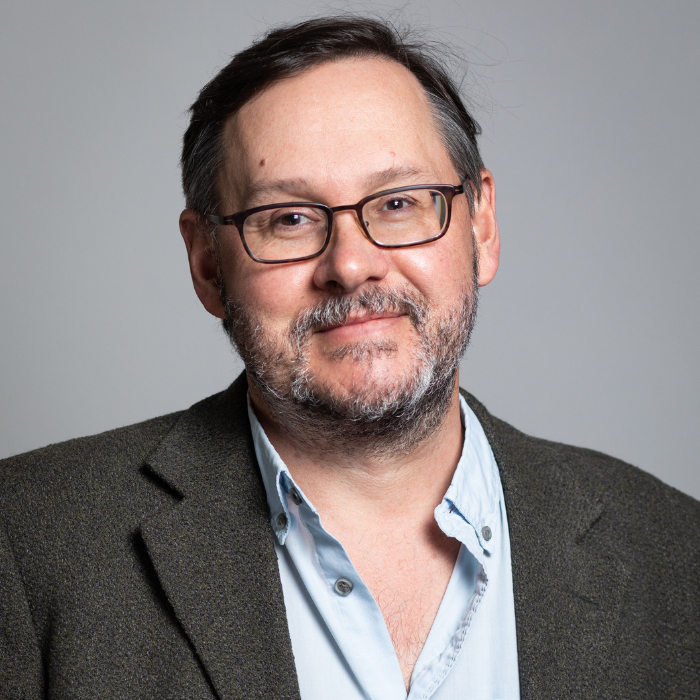
James Dodd
James Dodd is Professor of Philosophy at the New School for Social Research and Eugene Lang College, The New School, in New York. He specializes in phenomenology and 19th and 20th century continental philosophy. Current research includes the history of transcendental logic from Kant to Husserl, the philosophy of architecture, the philosophy of violence, the work of the Czech dissident philosopher Jan Patočka, and philosophical responses to the Cold War. He has been the recipient of numerous fellowships, including a Fritz-Thyssen Fellowship in 1996/1997 and an Alexander von Humboldt Fellowship in 2000. Publications include The Heresies of Jan Patočka: Phenomenology, History, Politics (Northwestern, 2023); Phenomenological Reflections on Violence. A Skeptical Approach (Routledge, 2017); Phenomenology, Architecture, and the Built World. Exercises in Philosophical Anthropology (Brill, 2017); Violence and Phenomenology (Routledge, 2009; Paperback, 2014); Crisis and Reflection: An Essay on Husserl’s Crisis of the European Sciences (Kluwer, 2004); as well as numerous articles on Hegel, Schelling, Nietzsche, and Husserl.
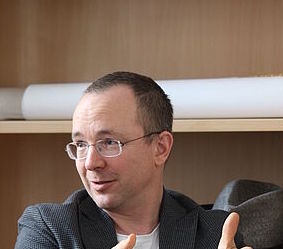
Michael Staudigl
Michael Staudigl is a Professor of Philosophy at the University of Vienna’s Department of Philosophy. He has been granted several research and visiting fellowships (Husserl Archives in Cologne, Harvard University, and the Institute for Human Sciences in Vienna), and directed research grants funded by the Austrian Science Funds. He has also given lectures and taught at several universities across the world. His research interests lie in continental philosophy, contemporary French philosophy, classical and contemporary phenomenology, interdisciplinary violence and war studies, social and political philosophy, and philosophy of religion and religious violence. He has published numerous papers, book chapters, and edited volumes in these areas, such as Phänomenologie der Gewalt (Springer, 2015), currently being translated into English, Gesichter der Gewalt (Fink, 2014), Figuren der Transzendenz (Königshausen & Neumann, 2013), and Phenomenologies of Violence (Brill, 2013), and also co-edited Konturen europäischer Gastlichkeit (Velbrück, 2016), amongst others. Currently, Staudigl is working on several book manuscripts and projects on phenomenological anthropology, violence, Kant and Husserl on transcendental logic, and more.
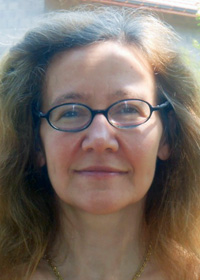
Natalie Depraz
Natalie Depraz obtained her PhD in Philosophy at the University of Paris Nanterre. She is currently Professor of contemporary philosophy and German philosophy at the Université de Paris X Nanterre, member of the Husserl Archives (ENS/CNRS) of Paris, and founder of the l’École rouennaise de phénoménologie. She is co-founder of Alter, Revue de Phénoménologie, as well as its current Director. Since 2020, she holds the Chair of Excellence in Philosophy at the University Galatasaray of Istanbul. She is an internationally renowned phenomenologist, with research related to cognitive sciences, psychopathology, neuroscience, the arts, and religion. She collaborated closely with the neurobiologist Francisco Varela, and has translated the works of authors like Husserl and Fink into French. Especially notorious amongst her numerous publications are Attention et vigilance, à la croisée de la phénoménologie et des sciences cognitives (Paris, 2014), and Le sujet de la surprise, un sujet cardial (Bucharest, 2018).
Program
Participants
Claudia Laos
Ph.D. in Philosophy from the University of Santiago de Compostela, Spain (2021). Coordinator of the International Reading Group of Kantian Texts (GILTKA), recognized by The Society of Kantian Studies in Spanish Language (SEKLE), she is also a member of Research Group on Social Philosophy (GIFS-PUCP). Her specialization revolves around topics related to dialogical rationality in Kant. Among her most recent publications are “Los planetas parecen retroceder. Reflexión, apparentia y error en Kant” in Con-Textos Kantianos 16 (2022), and “Sobre la imposibilidad del error total. De la pregunta por lo erróneo en la moral a la antinomia de la razón,” in Veritas 54 (2023).
Johann Pérez
Ph.D. in Education Sciences from the University of San Buenaventura (Medellín, Colombia). Researcher in the postdoctoral program in Social Sciences, Childhood, and Youth, with an emphasis on education, counter-hegemonic practices, and cultural transformation, offered by the Center for Advanced Studies in Childhood and Youth at CINDE. He is professor at the Master’s program in Education Sciences at the University of San Buenaventura. He is also teacher in secondary education (high school), and in a complementary training program at the Escuela Normal Superior in Antioquia. Additionally, he supervises master’s thesis in collaboration with the Pontifical Bolivarian University in Medellín, and is researcher in evaluation from a phenomenological perspective, both in theoretical and methodological terms. He has been awarded with the “Presbítero Miguel Giraldo Salazar” Civic Medal from the Government of Antioquia, Colombia, for his commitment in developing equitable, relevant, and context-based pedagogical practices.

Luz Ascárate
Luz ASCARATE is a non-tenured professor and researcher (ATER) at the University Paul Valéry Montpellier 3 and a PhD in philosophy from PUCP and EHESS. She is currently pursuing a second doctoral thesis, in metaphysics, under the supervision of Renaud Barbaras, at the University Paris 1 Pantheon-Sorbonne. Agrégée in philosophy, she is the author of the book Imaginer selon Paul Ricoeur. La phénoménologie à la rencontre de l’ontologie sociale (Paris, Hermann, 2022) and editorial secretary of Klēsis. Revue philosophique. She recently received the young researcher award from the Foundation de Treilles 2024 (France).
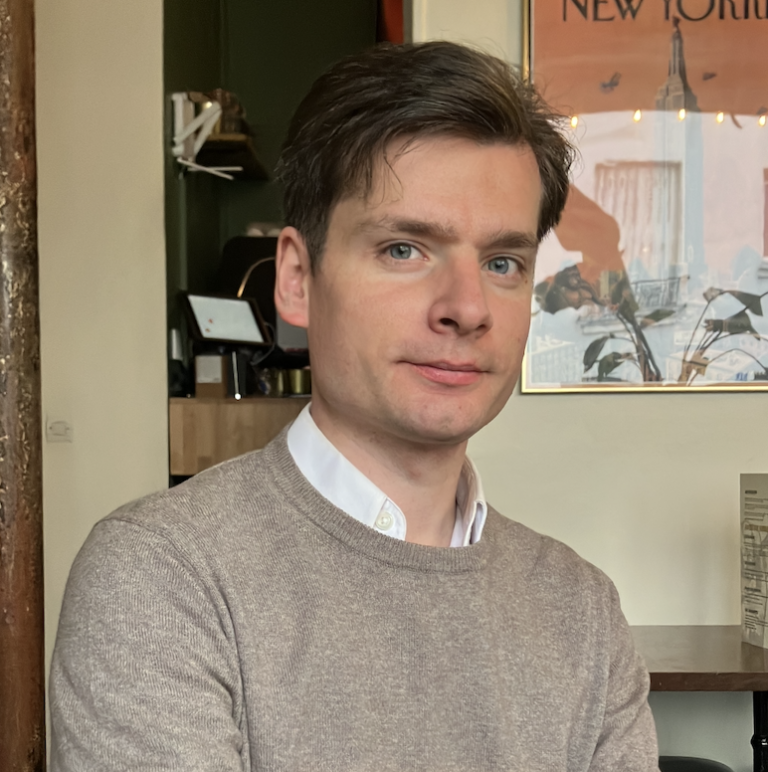
Quentin Gailhac
Quentin GAILHAC is an associate professor at the University of Paris Cité and a researcher at the University Paris 1 Panthéon-Sorbonne (HIPHIMO laboratory). He holds a PhD in philosophy from the University of Paris 1 Panthéon-Sorbonne. He is a graduate of the École Normale Supérieure de Lyon (2013-2017) and the Conservatoire de Paris (CNSMDP, 2016-2020). Agrégée in philosophy, he is the author of the book De la répétition. Langage musical et formes de l’invariance (Paris: Musica Falsa, 2022) and co-editor of the collective book titled Generative Words. New Phenomenological Perspectives on Space and Time (Lanham: Lexington Books, 2022).
Maribel Cuenca
She holds a Master’s degree in Philosophy from the Pontifical Catholic University of Peru, with the thesis The Experience of Truth in Heidegger’s Thought. She obtained her Professional Licencing from the same institution with a thesis on Practical Truth and the Rational Component in Aristotelian Ethics. She has taught courses such as Rhetoric and Argumentative Validity, Ethics, and Introduction to Philosophy at the same university. She currently teaches Argumentation as well as Science and Philosophy. She has participated in philosophical events and published several papers. She is currently preparing a doctoral thesis project on nature, world, and physis in Heidegger’s thought.
Ricardo Mendoza-Canales
Ricardo Mendoza-Canales obtained his PhD in Philosophy from the Autonomous University of Barcelona (UAB). His area of specialization is contemporary continental philosophy and his research interest focuses on the study of imagination and the imaginary, particularly at their intersections with phenomenology, epistemology, cultural studies, social ontology, politics, and aesthetics. Currently, he is FCT Junior Researcher at the School of Arts and Humanities of the University of Lisbon and coordinator of the Practical Philosophy Research Group (Praxis) at the Centre of Philosophy of the University of Lisbon (CFUL).
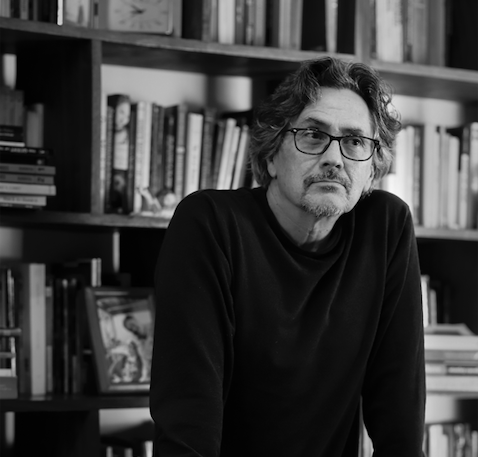
Victor J. Krebs
Victor J. Krebs (Ph.D., University of Notre Dame, USA) is a professor at the Department of Humanities, Pontificia Universidad Católica del Perú (PUCP). His current research focuses on psychoanalysis and the digital revolution. He is the author of Del Alma y el Arte (1998), La recuperación del sentido (2007), La imaginación pornográfica (2017). Co-author (with Richard Frankel) of Human Virtuality and Digital Life (2022) (Gradiva Book Prize by NAPP, 2022), and Courage to Dream (Book Prize by APSA, 2023). He is a philosophical curator, founder of the Jungian Circle of Peru, coordinator of the Latin American Posthumanism Network, and of the research group Hermes (Center for Philosophical Studies, PUCP).
Juan García Hernández
Bachelor of Philosophy and a student at the Postgraduate Program in Aesthetics and Art at Facultad de Filosofía y Letras (FFYL), Benemérita Universidad Autónoma de Puebla (BUAP). He served as the president of COMEFI (Mexican Community of Philosophy Students) in 2021. He has published in various philosophy journals and collaborated on independent writing projects through digital platforms like Triada Primate. His latest literary publication is Amanecer Línea (2022) by the Argentine publisher BAP. Currently, he works as an editorial assistant at La Fuente Collection, the publishing house of the Masters’ Program in Aesthetics and Art at the BUAP. He teaches philosophy and literature courses at an intermediate higher level. His main research interests include phenomenology, contemporary aesthetics, and conceptual writing.
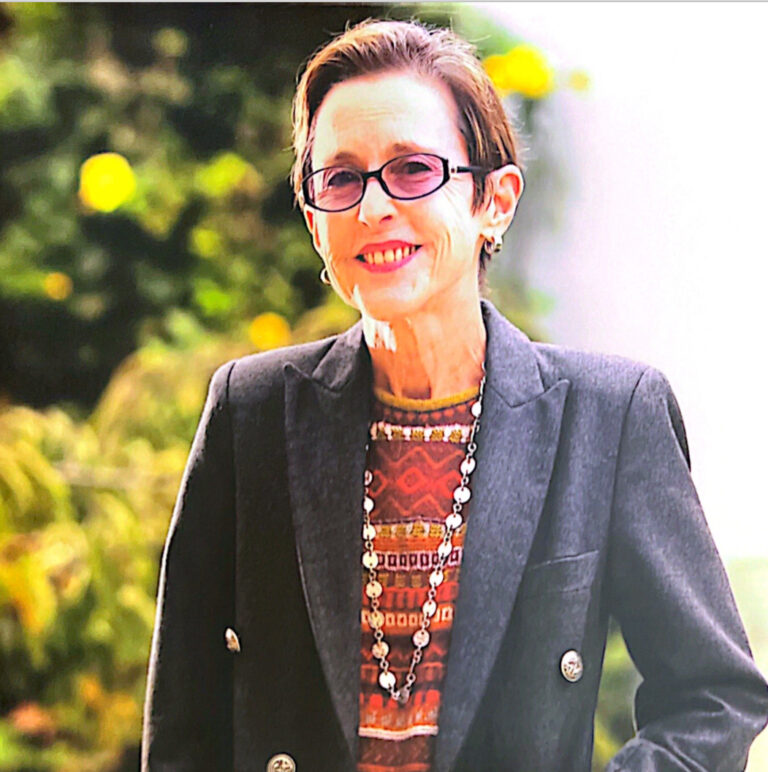
Rosemary Rizo-Patrón de Lerner
Doctora en Filosofía por la Universidad Católica de Lovaina (Bélgica), es profesora principal de la Pontificia Universidad Católica del Perú; Secretaria del Círculo Latinoamericano de Fenomenología (CLAFEN) y del Círculo Peruano de Fenomenología y Hermenéutica (CiphER); y miembro de varias sociedades y comités de revistas filosóficas internacionales y series de libros. Su investigación gira en torno a las filosofías trascendentales de Kant y Husserl, teoría del conocimiento y filosofía fenomenológica contemporánea. Es autora y editora de múltiples artículos y trabajos colectivos sobre estos temas. Autora de Husserl en diálogo, lecturas y debates (Bogotá/Lima: 2012), El exilio del sujeto, mitos modernos y posmodernos (Bogotá/Lima: 2014/2015), La agonía de la razón, reflexiones desde la filosofía práctica (Madrid/Lima: 2015); editora de El pensamiento de Husserl en la reflexión filosófica contemporánea (Lima: 1993), Interpretando la experiencia de la tolerancia (Lima: 2006); y co-editora de La razón y sus fines. Elementos para una antropología filosófica en Kant y Husserl (Hildesheim: 2013), y de La racionalidad ampliada, nuevos horizontes de la fenomenología y la hermenéutica (Bogotá/Lima: 2020).

Mariana Chu García
Ph. D. in Philosophy from the Catholic University of Louvain, Belgium, she is Professor and Coordinator of the Philosophy Section of the Department of Humanities of the Pontificia Universidad Católica del Perú and Director of its Center for Philosophical Studies. Ordinary member of the Latin American Circle of Phenomenology and the Peruvian Circle of Phenomenology and Hermeneutics, her areas of study are ethics and intersubjectivity, particularly from the phenomenology of Husserl and Scheler, topics on which she has published several articles in academic journals, including “Max Scheler et la phénoménologie des illusions morales” (Alter, 2023). She is editor, together with Rosemary Rizo-Patrón and Vania Alarcón of the book Métodos y Problemas. Perspectivas e investigaciones fenomenológicas actuales (Teseo, 2024). She is also translator, together with Mariano Crespo and Luis R. Rabanaque, of the book Introducción a la ética. Lessons from the summer semesters of 1920 and 1924 (Husserliana XXXVII) (Trotta, 2020).
Abstracts: Keynote lectures
Michael Staudigl (via Zoom), Confronting Violence in a Phenomenological Key: Between Everydayness and Spectacle
In this talk I propose to assess the yet unfathomed potentials of phenomenology to confront the very phenomenon of violence. Thinking about the manifold violences of our times, it starts from the premise that violence is not one but has many faces and interdependent forms. Accordingly, I put forward a relational conception of violence in order to explore the interplay between its visible and invisible forms. In the last analysis, I will advance the hypothesis that our inherently violent late modern social imaginaries are parasitic upon the violence they fear and repel. This implies first and foremost that our (Western) representations of violence are caught in a spectacle of “other violence” that silently eclipses its own violent structures.
Natalie Depraz (via Zoom), Husserl and Beauvoir: Body and Sex
Simone de Beauvoir did not meet Husserl. This is no “big scoop”, although considering the dates it could have been so, as we will see. In this presentation, I will examine different modalities of the relationship between both philosophers, from the most expected ones to the most surprising, exploring how—regarding sexual experience—the successor prolongs the predecessor, but also, in a more unprecedented way, the predecessor anticipates the successor. Hence, I’ll deal first with Simone de Beauvoir’s direct or indirect references to Husserl in For a moral of ambiguity, along the guiding thread of the perceptual experience and, more amply, of intentionality. Then, I will see how Beauvoir, in The second sex, uses Husserl mainly regarding the topic, central to both, of bodily experience. Finally, through the topic of the experience of the other and more specifically of sexuality, it will be shown how Beauvoir prolongs Husserl, but also how the latter offers novel views on sexual experience in texts that were in fact unknown to Beauvoir, and that thus certainly benefit when placed in resonance with Beauvoirian expressions.
James Dodd (via Zoom), Reflections on Historicity
This paper explores the insight, found in the early Nietzsche and the Heidegger of Being and Time, that finitude binds human beings to history, providing the latter both its impetus and meaning. After an explication of the conception of historicity that draws on both Heidegger and Nietzsche, the essay turns to the consideration of the critique of contemporary scientific historiography exercised by both thinkers, and describes as a paradigmatic example the French Annales school. The basic argument of the paper is that, however compelling, the conception of historicity defended by Nietzsche and Heidegger is too restrictive, and that a reflection on modern historiography influenced by trends such as the Annales and more recent approaches points to a broader horizon of human being in historical time that has been neglected in the philosophy of history.
Abstracts: Speakers
SESSION I (Wednesday 15)
Martin Rosado, How Musical is Nature? Heidegger and Von Uexküll
Far from the Galilean view of the world, Edmund Husserl maintains another way of describing the stratum of material nature. Thus, if one revisits Ideas II, The Crisis, or The Earth Does Not Move, one may conclude that the Husserlian view of nature is the following: a material substrate upon which the psychic and cultural strata are constituted. However, another phenomenological image of nature can complement the “classical” conception presented by Husserl’s phenomenology. This exposition’s specific goal is to outline an alternative image of nature from within phenomenology itself or from representatives close to phenomenological thinking. Therefore, our exposition is not limited to describing the thoughts of a single author. Instead, based on several authors (Husserl, Heidegger, and Uexküll), I outline an alternative way of conceiving the natural world without the need to resort to a mechanistic view.
Claudia Laos (via Zoom), Kant and Gadamer in Dialogue on the Kantian Distinction Between Provisional Judgment and Prejudice
Gadamer’s hermeneutic rehabilitation of prejudice, reduced by modern thought to a mere source of error, has, among other merits, made explicit the historicity of consciousness and rescued the contribution of tradition as a source of truth. However, it offers a conception of the former that is too undifferentiated from the one developed by Kant, whose distinction between provisional judgment and prejudice not only shows a striking proximity to Gadamer’s regarding the acknowledgment of a permanently anticipatory, perspectival, and self-correcting awareness that accompanies the whole process of judging. It also draws a thin but clear line to differentiate one from the other, offering elements of analysis within the field of applied logic, which are of great interest and relevance for the development of a critical theory of prejudice beyond the epistemological realm.
SESSION II (Wednesday 15)
Johann Pérez, Cruelty and Bodies as Texts: A Polyphony Within Silence
This text follows a reflection towards a path of three stations that symbolize, in part, the route that the victims of forced disappearances in Puerto Torres, Caquetá–Colombia, had to endure since 2000. Stations that researcher Helka Quevedo delimits as vital points in the design of death that the Paramilitaries of the Bloque Sur of Andaquíes ordered to torture, humiliate, and slowly murder those whom they accused of being enemies. The three places not only constitute a space that represents torture and gallows where the decisions to make the “other” die are carried out but from this writing they are redefined, based on the vectors of subjectivity and intersubjectivity, as elements of phenomenological analysis, from the acts and interactions of violence that allow us to establish a philosophical reflection of the human within the framework of the dehumanization of war and the extermination of the “other” from the “I can.”
Luz Ascárate (via Zoom), Seeing the Unseen. From Absolute Exclusion to Radical Hospitality
Faced with contemporary theories of exclusion that attempt to determine who the current world’s “excluded” ones are, a paradox arises: everyone defined as excluded is methodologically included in a theory of inclusion constituted by the power conditions of this historical moment. There is, therefore, an indeterminate or theoretically undefined “excluded” person who evades these theories, which is due to the political presuppositions of each theory in force, rendering us incapable of determining who are the excluded ones that we are not allowed to see through the lenses of the historically determined theories. This contribution attempts to provide an ethical solution to this paradox, based on the phenomenological models of radical hospitality outlined by Paul Ricoeur (« La condition d’étranger », Esprit, 323, 2006, pp. 260-271), and Jacques Derrida (De l’hospitalité. Anne Dufourmantelle invite Jacques Derrida à répondre, Paris: Calmann-Lévy, 1997). These models allow us to answer how to act ethically facing someone excluded who is, in principle, absolutely unseen.
SESSION III (Thursday 16)
Quentin Gailhac (via Zoom), Can Reason Be Any Other Way than ‘In Crisis’? Reflections on the Essence of Reason in Husserl and Whitehead
The crisis of the contemporary world is often presented as a crisis of reason, in the sense that reason is no longer able to assert its authority. The crisis of reason is thus confused with the history of its external weakening. In its practical aspect, reason is unable to contain violence or ideology; in its speculative aspect, reason allows itself to be overcome by beliefs and superstitions that constantly put it in crisis. From a cross-reading of Husserl and Whitehead, we would like to show, on the contrary, while rejecting the thesis of the external weakening of reason, that reason is a faculty phenomenologically linked to the concept of crisis and, even more, essentially definable as an internal crisis of its functioning. This internal crisis contains, in the practical domain, the idea of an improvement of life as a problem, and, in the speculative domain, that of a questioning of the conditions of scientific explanation. This will make it possible to delimit, in broad outline, the positive aspect inherent in the rationality of the concept of crisis.
Maribel Cuenca, The (Non)Sense of Overcoming a Crisis: Reflections from Heidegger’s Thought Regarding the Overcoming
Beginning with the often stated fact that we live in a crisis-ridden world, this presentation seeks to identify elements within Heidegger’s notion of overcoming, understood as nourishing our reflection about the nature of the crisis and, consequently, about the role of human beings within it. We will begin by listening to Husserl’s call to pay heed to the crisis and, then, we will draw attention to its inscription in a dialectically read history; next, we will highlight the connection between the crisis and the unexplainable. At this point, Heideggerian thought will allow us to emphasize how the fear of the incomprehensible finds a safe haven in the One, and thus how the crisis is inherent to the context of the end of metaphysics. Hence, we will relate the overcoming of metaphysics to the overcoming of the crisis. Finally, we will question the possibility of a definite ending of the crisis, or rather of permanently dwelling on it.
Ricardo Mendoza-Canales, On Standpoints: Ideology, Critique and Post-Truth
This paper challenges the assumption that the pair Truth/Post-Truth is a real dichotomy. Based on tools drawn from ‘classical’ and ‘critical’ phenomenology, it discloses that: 1) post-truth is neither the reverse, the negation, nor the falsification of truth and thus cannot be put in an oppositional relationship; and 2) post-truth cannot be conceived solely as an epistemic flaw in the rationality and systems of beliefs of a given society, but rather also as the reproduction of ideological claims drawn-from and reproduced-in public media. This reveals that our increasingly technically mediated relation with the world is not neutral, but instead ideologically informed. Even ‘truth’ and ‘facts’ can turn into mere commodities according to particular economic interests. Insofar as real, social (perceptual) experiences are in decline, our relationship with the world and the subsequent sense-formation cannot remain unaffected. I conclude with a plea for a refashioned ‘reduction’ as a precondition for phenomenological critique.
SESSION IV (Friday 17)
Juan García Hernández, Reflections on an Ecology of Machines Based on Yuk Hui
The aim of this proposal is to answer the question: to what extent is it possible to interpret machine-made art based on the notion of machine ecology? To offer a response, we will divide our contribution into three moments. First, we will explain two issues: on the one hand, the problematic ambiguity between the terms “ecology” and “machine;” and on the other, the concept of techno-diversity, for which we will draw on the Chinese philosopher Yuk Hui’s thought in his most recent book Art and Cosmotechnics. Subsequently, we will identify how contemporary machines tend to recognize purposes beyond human control, and hence, the necessity to overcome the mechanistic view in favor of an organic and recursive perspective. Finally, we will examine Eugenio Tisselli´s artistic project PAC (Computer Assisted Poetry) to show how the understanding of such work implies the conceptual framework offered by Yuk Hui.
Victor Krebs, Zoon Pharmakon. Towards a Posthuman Re-evolution
After three blows from Copernicus, Darwin, and Freud, humanism and its anthropocentrism are facing a fourth, that of Artificial Intelligence. AI suggests that perhaps our rational capacity isn’t what distinguishes our species, prompting reflection on the spontaneity of life (Zoe) in its various technological modulations. From a posthuman perspective (distinct from transhumanism), we reflect on technology not as an instrument of domination but as something that grows from within us and, like a symptom or a screen—as well as a pharmakon—opens a new space for self-knowledge, that is crucially important in these times of crisis and transformation.
SESSION V (Friday 17), A Phenomenology of Human Finitude: Temporality and Responsibility.
Kant discovers human contingency in the temporal conditions of knowledge, thus shaking the rationalist pillars of Western culture. Since Modernity, this limitation has been dismissed by the development of potent formal-technological tools. However, radical human finitude is evidenced in 20th-century successive crises, anticipated by philosophy and globally evinced in science, culture, and society. This contribution focuses on Husserl’s attempt to examine the possibility of a universally rational theory of science built upon the psychic temporal underground of human embodied consciousness. Leaning on passages from the Bernau Manuscripts of Time Consciousness and his 1920 Logic course, emphasizing the role of protention and expectation, it highlights the genesis of rationality from passive, temporal, and associative syntheses of pre-predicative human experience, the narrow scope of consciousness, the role of attention, and the “typicality” ascribed to the future horizon. As its open-ended character only admits probabilistic anticipations, it concludes by turning to radical responsibility as the ultimate rational resort (axiological-voluntary) left to humanity in times of crisis and ever-growing invisibility.
Mariana Chu García, Max Scheler and the Phenomenology of Moral Deceptions
We only know values when we feel, prefer, love, or hate. If one deals with intuitively evident knowledge, our loving is necessarily motivated to carry out the value. Retrieving in this way Socrates’ thesis on knowledge and virtue, Scheler purports that if values are not given immediately in themselves, then we are subject to the possibility of valuing deceptions (Täuschungen). Since “good” is the act of loving that carries out a positive or higher value, and “evil” is the one that puts forth a negative or inferior value, deceptions regarding extra-moral values amount to moral deceptions or illusions. This contribution presents a typology of moral deceptions, following Scheler’s knowledge criteria or measures that concern deception in general, and without any pretense of exhausting the topic.
Schedule
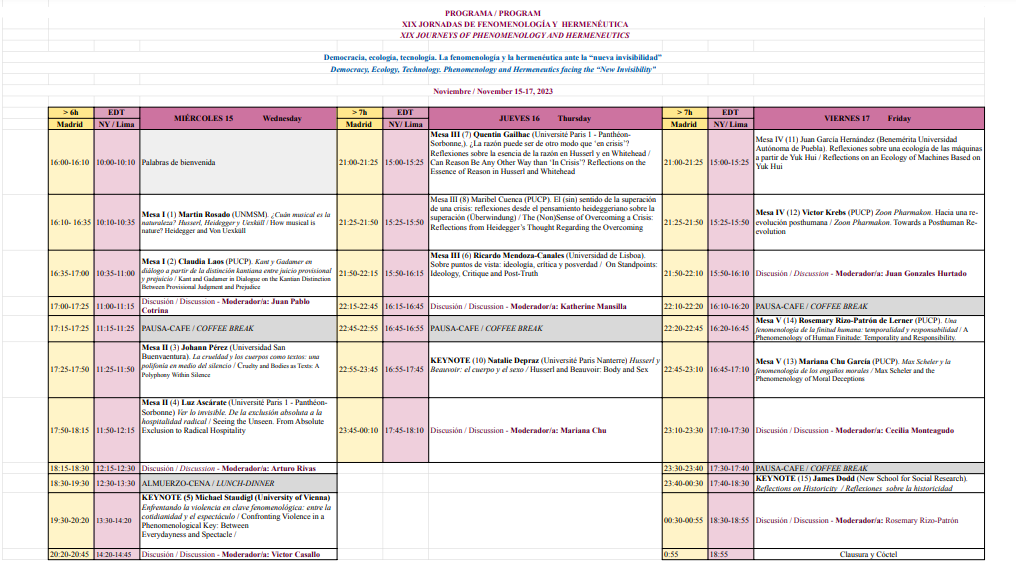
¿Deseas más información?
Déjanos tus datos en este formulario y nuestro equipo se pondrá en contacto contigo para darte mayor información sobre este evento.

